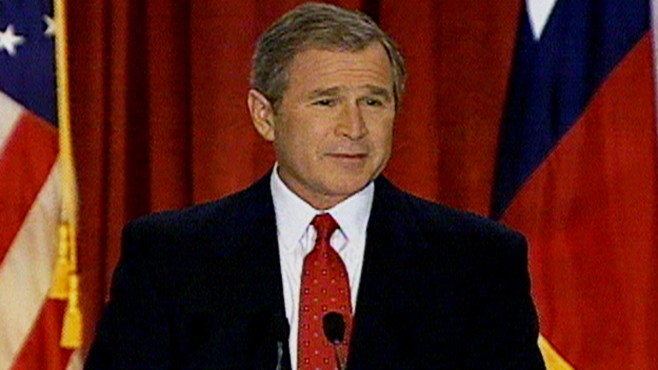November 28th, 2000. Dick Cheney's Funeral takes place:
On November 28th, 2000, Republican Vice Presidential nominee Dick Cheney's funeral took place. The funeral services were in Cheney's hometown in Wyoming. In attendance were Governor George W. Bush and his wife Laura, Former Presidents George H.W. Bush and Gerald Ford, as well as their wives, Vice President and Mrs. Gore, President and Mrs. Clinton, as well as Senator and Mrs. Lieberman. Also in attendance were Colin Powell, the former chairman of the Joints Chief of Staff and his wife, Former Defense Secretary Donald Rumsfeld, as well as current and former members of the House and Senate, including Speaker of the House Dennis Hastert and former Speaker of the House Newt Gingrich. Powell, Former President Bush, and Former Secretary Rumsfeld spoke at the funeral.
December 12th, 2000. U.S. Supreme Court rules the State Wide Recount in Florida Unconstitutional:
On December 12th, 2000 in a 7-2 decision, the United States Supreme Court ruled that the Florida Supreme Court ruling requiring a state wide recount of ballots was unconstitutional. The Court also, by a 5-4 vote, ruled that the Florida recounts could not be completed before a December 12 "safe harbor" deadline, and should therefore cease and the previously certified total should hold.
December 13th, 2000. Bush wins Florida by 537 votes, Gore Concedes:
On December 13th, 2000, Al Gore conceded the election to George W. Bush after the Supreme Court declared the recount unconstitutional, declaring Bush the winner. Gore, in his speech, said that while he, like his supporters, disagreed with the Court's decision, he accepted it. He urged Americans to unite behind the President Elect.

Shortly after Gore conceded, President Elect George W. Bush gave his acceptance speech from the Texas House of Representatives chamber. In his speech, Bush thanked Al Gore and Joe Lieberman for a spirited campaign. The President Elect also said that he knew how hard this must've been for the Gore and Lieberman families. Bush also thanked his family and paid tribute to his late running mate, who he said, played a key role in his victory. Bush also thanked his supporters and used the opportunity to reach out to those who supported the Vice President, saying that he was going to reach across party lines to bridge an America divided. He also said that "the President of the United States is the President of every single American, of every race, and every background."

This marked the beginning of Bush's transition into office. However, Bush not only had the task of transitioning into the Presidency. He also had to, as he did during the campaign, vet and select someone to be his Vice President.



